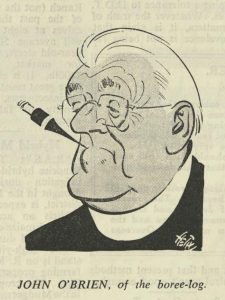[Editor: This article, about John O’Brien, is an extract from the “Personal Items” column published in The Bulletin (Sydney, NSW), 28 May 1952.]
[Personal items: Monsignor Hartigan]

The talk lingered pleasantly on the wheel-bases and speeds of cars (Hartigan was the second priest in Australia to own one); on paintings (the convent owns a fine set of prints of the masters); on ships and their flags (from his book-packed study he hobbies with identifying every ship that enters the harbor); and, of course (Hartigan having recently written the history of Sydney’s Darlinghurst parish), on books and the men who write them. And on reminiscences.
One of the best in a full life was of the time young Hartigan struggled for miles through Snowy River mountains to administer the last sacraments to a dying stockrider named Riley. To entertain the sick man’s friends — mainly riders — the young priest recited, appropriately enough, “The Man from Snowy River.” It was received in a strange silence. To the reciter’s query, one stockman jerked his thumb towards the sickroom door. “The bloke inside is the man from Snowy River.” Hartigan claims it was later proved that he was.
The pen-name stems from his watching, in a country town, a milk-vendor named John O’Brien go past — he was known for selling adulterated milk. “Adulterated milk,” I thought; “that’s me. So John O’Brien it was.”
Patrick Joseph Hartigan was born at Yass 72 years ago — his mind is as young as ever.
Source:
The Bulletin (Sydney, NSW), 28 May 1952, p. 23 (columns 3-4)
Editor’s notes:
kauri = (Maori) the common name for Agathis australis, a conifer tree (of the genus Agathis, family Araucariaceae), native to the northern part of the North Island of New Zealand
pile = a mansion; a large building; a group of buildings
Red Page = the literature section of The Bulletin (Sydney, NSW), which included literary reviews, poems, and items regarding literature and writers (it was named the “Red Page” as it was published on the inside of the publication’s cover, which was printed on paper of a reddish colour)
stockrider = someone who works with stock (i.e. livestock, e.g. cattle, sheep), droving, herding, mustering, branding, etc.; a herdsman; in North America, a stockrider is known as a cowboy
[Editor: Added a full stop after “proved that he was”.]
[Editor: The original text has been separated into paragraphs.]
Leave a Reply